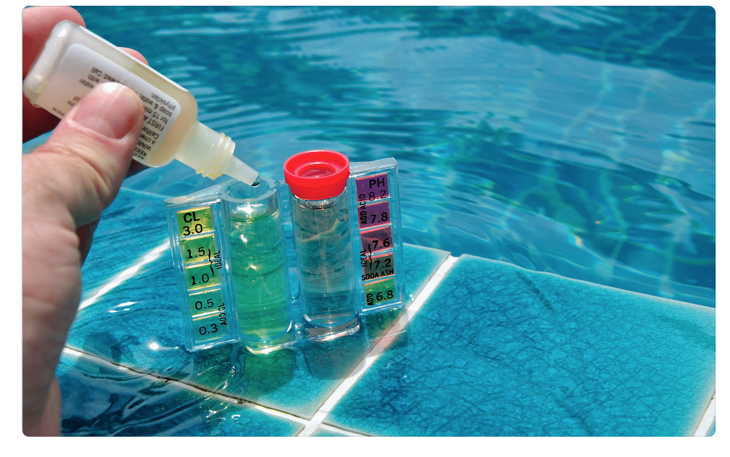
By the Pool & Repair Experts at GL Pools
Swimming is a popular activity enjoyed by millions of people around the world—and for good reason. From lounging in the pool or spa after a hard day to hosting friends for a special pool party, backyard swimming pools boast unlimited potential. To maintain a safe and comfortable swimming environment, regular swimming pool maintenance is essential. And one crucial aspect of pool maintenance is ensuring consistent chlorine levels in your pool or spa.
Chlorine is a powerful disinfectant that helps to eliminate harmful bacteria and viruses in the water. However, the service required to balance chlorine levels can be a challenging task, and failure to do so can have serious consequences. In this blog, we will explore the importance of pool maintenance and keeping consistent chlorine levels in pools and spas to ensure the safety and comfort of swimmers.
When pool owners fail to ensure their chlorine levels are kept at the correct level, an array of pool maintenance issues can arise. To learn more, continue reading below to discover some of the top issues related to improper chlorine maintenance of pool water.
At GL Pools, we take a balanced and comprehensive approach to pool chemical maintenance. That means our professionals not only look at chlorine levels but also at all other chemistry readings related to the effectiveness of chlorine in the water. Primarily, this includes the following factors.
We always make balancing your pH levels a top priority in our swimming pool maintenance services to prevent various issues down the line. For example, when pH levels are too high, this can lessen the effectiveness of your chlorine, according to the CDC. Additionally, high pH levels can also cause skin and eye irritation in swimmers and damage to pool equipment. On the other hand, low pH levels can cause corrosion to metal surfaces, as well as damage to plaster and concrete surfaces in the pool. With proper swimming pool maintenance of pH levels, we can ensure that your pool water remains comfortable for swimmers and that your pool equipment lasts longer. This lets you avoid unexpected San Diego pool repair and allows you to focus on the fun and relaxation of having a pool.
Monitoring the level of cyanuric acid is a crucial aspect of swimming pool maintenance, as it provides important information about the effectiveness of chlorine in the water. For instance, when too high, your chlorine can be rendered ineffective. On the other hand, low cyanuric acid levels can cause your chlorine to evaporate too quickly. As one of the leading pool service companies in San Diego, GL Pools offers comprehensive swimming pool maintenance services that include weekly testing of most chemistry levels like free chlorine, total chlorine, pH, and total alkalinity, and monthly testing of cyanuric acid. This allows us to identify any imbalances and adjust accordingly. And if your cyanuric acid level is too high, our swimming pool service can take care of draining and refilling your pool, or recommend a reverse osmosis service in San Diego.
When it comes to chlorine, there are several different kinds from which to choose for your pool maintenance. At GL, we aim to balance the different types of chlorine usage, including the primary three found below.
Liquid chlorine, also known as sodium hypochlorite, is what is used for most chlorine maintenance in pools. It can either be slow-fed in conjunction with a roll-a-chem/Stenner pump and chemical automation system or added directly during pool cleaning by a trusted technician. Naturally, liquid chlorine has a high pH which should be considered when balancing the pH level. Finally, liquid chlorine adds salt to pools over time.
Chlorine tablets (tri-chlor) are often the chlorine method of choice for those with pools that DON’T have a salt cell. In these cases, it is either added during pool maintenance to a tab floater in the water, or to a tablet feeder attached to the equipment. Chlorine tablets naturally have a low pH and they are known to raise cyanuric acid levels over time, which is why we limit its usage with our swimming pool service as much as possible.
Salt cell chlorine generators utilize the salt found in a pool (3000-3600ppm is ideal for most cells) to create chlorine gas through electrolysis. Over time, salt cell chlorine generators will raise pH over time and the pool will need to be cleaned quarterly via an acid bath. If needed, liquid chlorine can be used for swimming pool maintenance, however, chlorine tablets are seldom used in conjunction with salt cells. At GL, we monitor salt cells to ensure they’re regulating chlorine levels appropriately while adding salt to the water as needed. Finally, salt cell chlorine generators must be fully replaced every 3-5 years.
If you need help or your needs are specific to the chemicals used —we’ve got you covered. Our personalized and attentive pool maintenance will ensure that your pool is always in top condition, with crystal-clear water and a comfortable environment for swimmers. By partnering with a trusted swimming pool service provider like GL Pools, you can rest assured that your pool is in good hands. Whether you need routine cleanings or specialized pool chemical maintenance, our team has the expertise and experience to deliver exceptional results. To learn more about our services, contact us today and let us help you dive into pool maintenance and enjoy a healthy and inviting pool all season long.
Contact us today to see why 99% of our customers stay with us month after month despite not having a contract.
Get a quote